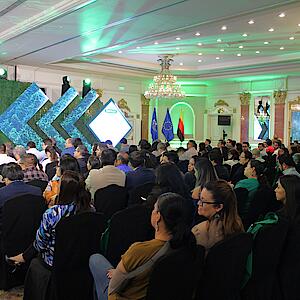During COP26, CABEI presents Costa Rica's Electric Train project as a paradigm shift in public transportation in the region

Currently, 41% of the Bank's approvals are aimed at mitigating climate change.
Tegucigalpa, November 01, 2021.- The Costa Rican Electric Passenger Train project was introduced on Monday at a panel discussion during COP26 as a benchmark and flagship public transportation initiative in the region to change the paradigm of urban mobility towards an efficient and sustainable one.
The event, broadcast on the International Development Finance Club (IDFC) channel, was attended by the First Lady of the Republic of Costa Rica, Mrs. Claudia Dobles, the Head of the Strategic Alliances and International Cooperation Department of the Finance Management Department of the Central American Bank for Economic Integration (CABEI), Miguel Méndez, and the Deputy Executive Director of the United Nations Green Climate Fund (GCF), Javier Manzanares.
The three panelists agreed on the importance of supporting and developing such an important project that will place the region in the eyes of the world, as there is none of its kind in Latin America. The project is financed by CABEI and GCF for US$550 million, in addition to a US$21 million donation from GCF.
"CABEI is Central America's strategic partner for making projects such as this one a reality. We are the multilateral that channels the most resources from the GCF and we are clear that transportation is a key integration issue, which is why we are also executing technical cooperation so that all the projects we are developing in the region can be integrated," explained Méndez during his speech.
The panelists emphasized that Costa Rica's Electric Train would be powered by renewable energy sources that currently provide more than 98% of its electricity from sustainable sources, in addition to being an important source of employment for the reactivation of the economy.
CABEI is currently supporting the development of three railroad initiatives in the region in addition to the Electric Passenger Train, such as the Limonense Electric Freight Train-TELCA, also in Costa Rica, the Pacific Railroad in El Salvador, and the Guatemalan segment of the Central American rail freight connection in Guatemala.


![[Translate to English:] [Translate to English:]](/fileadmin/_processed_/e/3/csm_WhatsApp_Image_2024-04-18_at_2.12.23_PM__2__590ef43ade.jpeg)
